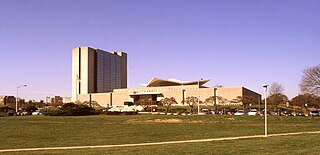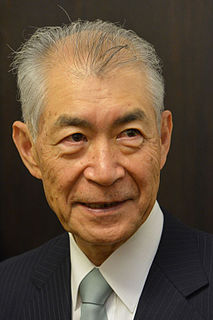Related Research Articles
Alternative medicine is any practice that aims to achieve the healing effects of medicine, but which lacks biological plausibility and is untested, untestable or proven ineffective. Complementary medicine (CM), complementary and alternative medicine (CAM), integrated medicine or integrative medicine (IM), and holistic medicine are among many rebrandings of the same phenomenon. Alternative therapies share in common that they reside outside medical science, and rely on pseudoscience. Traditional practices become "alternative" when used outside their original settings without proper scientific explanation and evidence. Frequently used derogatory terms for the alternative are new-age or pseudo, with little distinction from quackery.

Traditional Chinese medicine (TCM) is a branch of traditional medicine in China. It has been described as "fraught with pseudoscience", and the majority of its treatments as having no logical mechanism of action.

Hippocrates of Kos, also known as Hippocrates II, was a Greek physician of the Age of Pericles, who is considered one of the most outstanding figures in the history of medicine. He is often referred to as the "Father of Medicine" in recognition of his lasting contributions to the field as the founder of the Hippocratic School of Medicine. This intellectual school revolutionized Ancient Greek medicine, establishing it as a discipline distinct from other fields with which it had traditionally been associated, thus establishing medicine as a profession.

Homeopathy or homoeopathy is a pseudoscientific system of alternative medicine. It was conceived in 1796 by the German physician Samuel Hahnemann. Its practitioners, called homeopaths, believe that a substance that causes symptoms of a disease in healthy people can cure similar symptoms in sick people; this doctrine is called similia similibus curentur, or "like cures like". Homeopathic preparations are termed remedies and are made using homeopathic dilution. In this process, the selected substance is repeatedly diluted until the final product is chemically indistinguishable from the diluent. Often not even a single molecule of the original substance can be expected to remain in the product. Between each dilution homeopaths may hit and/or shake the product, claiming this makes the diluent remember the original substance after its removal. Practitioners claim that such preparations, upon oral intake, can treat or cure disease.

Medicine is the science and practice of establishing the diagnosis, prognosis, treatment, and prevention of disease. Medicine encompasses a variety of health care practices evolved to maintain and restore health by the prevention and treatment of illness. Contemporary medicine applies biomedical sciences, biomedical research, genetics, and medical technology to diagnose, treat, and prevent injury and disease, typically through pharmaceuticals or surgery, but also through therapies as diverse as psychotherapy, external splints and traction, medical devices, biologics, and ionizing radiation, amongst others.

Neurology is a branch of medicine dealing with disorders of the nervous system. Neurology deals with the diagnosis and treatment of all categories of conditions and disease involving the central and peripheral nervous systems, including their coverings, blood vessels, and all effector tissue, such as muscle. Neurological practice relies heavily on the field of neuroscience, the scientific study of the nervous system.

A physician, medical practitioner, medical doctor, or simply doctor, is a professional who practises medicine, which is concerned with promoting, maintaining, or restoring health through the study, diagnosis, prognosis and treatment of disease, injury, and other physical and mental impairments. Physicians may focus their practice on certain disease categories, types of patients, and methods of treatment—known as specialities—or they may assume responsibility for the provision of continuing and comprehensive medical care to individuals, families, and communities—known as general practice. Medical practice properly requires both a detailed knowledge of the academic disciplines, such as anatomy and physiology, underlying diseases and their treatment—the science of medicine—and also a decent competence in its applied practice—the art or craft of medicine.

The Nobel Prize in Physiology or Medicine is awarded yearly by the Nobel Assembly at the Karolinska Institutet for outstanding discoveries in physiology or medicine.
Internal medicine or general internal medicine is the medical specialty dealing with the prevention, diagnosis, and treatment of internal diseases. Physicians specializing in internal medicine are called internists, or physicians in Commonwealth nations. Internists are skilled in the management of patients who have undifferentiated or multi-system disease processes. Internists care for hospitalized and ambulatory patients and may play a major role in teaching and research. Internal medicine and family medicine are often confused as equivalent in the Commonwealth nations.

Ayurveda is an alternative medicine system with historical roots in the Indian subcontinent. The theory and practice of Ayurveda is pseudoscientific. The Indian Medical Association (IMA) characterises the practice of modern medicine by Ayurvedic practitioners as quackery.

The United States National Library of Medicine (NLM), operated by the United States federal government, is the world's largest medical library.

Doctor of Medicine is a medical degree, the meaning of which varies between different jurisdictions. In the United States, and some other countries, the M.D. denotes a professional graduate degree. This generally arose because many in 18th-century medical professions trained in Scotland, which used the M.D. degree nomenclature. In England, however, Bachelor of Medicine, Bachelor of Surgery was used and eventually in the 19th century became the standard in Scotland too. Thus, in the United Kingdom, Ireland and other countries, the M.D. is a research doctorate, higher doctorate, honorary doctorate or applied clinical degree restricted to those who already hold a professional degree in medicine; in those countries, the equivalent professional to the North American and some others use of M.D. is still typically titled Bachelor of Medicine, Bachelor of Surgery (M.B.B.S.).

Herbal medicine is the study of pharmacognosy and the use of medicinal plants. Plants have been the basis for medical treatments through most of human history, and such traditional medicine is still widely practiced today. Modern medicine makes use of many plant-derived compounds as the basis for evidence-based pharmaceutical drugs. Although herbalism may apply modern standards of effectiveness testing to herbs and medicines derived from natural sources, few high-quality clinical trials and standards for purity or dosage exist. The scope of herbal medicine is sometimes extended to include fungal and bee products, as well as minerals, shells and certain animal parts.

Traditional medicine comprises medical aspects of traditional knowledge that developed over generations within various societies before the era of modern medicine. The World Health Organization (WHO) defines traditional medicine as "the sum total of the knowledge, skills, and practices based on the theories, beliefs, and experiences indigenous to different cultures, whether explicable or not, used in the maintenance of health as well as in the prevention, diagnosis, improvement or treatment of physical and mental illness". Traditional medicine is contrasted with scientific medicine.
A medical school is a tertiary educational institution, or part of such an institution, that teaches medicine, and awards a professional degree for physicians and surgeons. Such medical degrees include the Bachelor of Medicine, Bachelor of Surgery, Doctor of Medicine (M.D), or Doctor of Osteopathic Medicine (D.O). Many medical schools offer additional degrees, such as a Doctor of Philosophy (Ph.D), Master's degree (M.Sc), a physician assistant program, or other post-secondary education.
Bachelor of Medicine, Bachelor of Surgery, or in Latin: Medicinae Baccalaureus Baccalaureus Chirurgiae, are the two first professional degrees in medicine and surgery awarded upon graduation from medical school by universities in countries that follow the tradition of the United Kingdom. The historical degree nomenclature states that they are two separate undergraduate degrees; however, in practice, they are usually combined as one and conferred together, and may also be awarded at graduate-level medical schools. In countries that follow the tradition of continental Europe or the system in the United States, the equivalent medical degree is awarded as Doctor of Medicine (MD) or Doctor of Osteopathic Medicine (DO) — the latter in the United States only.
A medical specialty is a branch of medical practice that is focused on a defined group of patients, diseases, skills, or philosophy. Examples include children (paediatrics), cancer (oncology), laboratory medicine (pathology), or primary care. After completing medical school, physicians or surgeons usually further their medical education in a specific specialty of medicine by completing a multiple-year residency to become a specialist.

Tasuku Honjo is a Japanese physician-scientist and immunologist. He shared the 2018 Nobel Prize in Physiology or Medicine and is best known for his identification of programmed cell death protein 1 (PD-1). He is also known for his molecular identification of cytokines: IL-4 and IL-5, as well as the discovery of activation-induced cytidine deaminase (AID) that is essential for class switch recombination and somatic hypermutation.
Raman Viswanathan (1899–1982) was an Indian chest physician, medical mycologist and pulmonologist, considered by many as the father of Chest Medicine in India. He was the founder director of Vallabhbhai Patel Chest Institute, a postgraduate medical institute based in Delhi. An elected fellow of the American College of Chest Physicians, Royal College of Physicians of London, Indian National Science Academy and the Academy of Medical Sciences, United Kingdom, he was a recipient of several honors including the Forlanini Medal by Italian Tuberculosis Association and the Eugeno Morelli Prize of the National Academy of Sciences, Italy. The Government of India awarded him the third highest civilian honour of the Padma Bhushan, in 1974, for his contributions to medicine.
References
- ↑ Ronald B. George (2005). Chest medicine: essentials of pulmonary and critical care medicine. Lippincott Williams & Wilkins. pp. 83–. ISBN 978-0-7817-5273-2 . Retrieved 7 June 2011.
| | This medical diagnostic article is a stub. You can help Wikipedia by expanding it. |